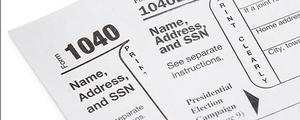PRINCETON, NJ -- Americans break into two roughly evenly matched camps on the question of whether the government should enact heavy taxes on the rich to redistribute wealth in the U.S. Forty-seven percent believe the government should redistribute wealth in this way, while 49% disagree, similar to views Gallup found four years ago.
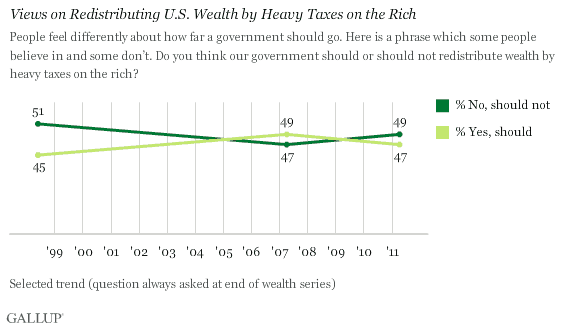
Republicans and Democrats have sharply different reactions to the government's taking such an active role in equalizing economic outcomes. Seven in 10 Democrats believe the government should levy taxes on the rich to redistribute wealth, while an equal proportion of Republicans believe it should not. The slight majority of independents oppose this policy.
The question also provokes different reactions from men compared with women, whites vs. nonwhites, and upper-income vs. lower-income Americans. Consistent with their more Democratic political orientation, women, nonwhites, and lower-income adults are all more supportive than their counterparts of government redistribution of wealth via taxes.
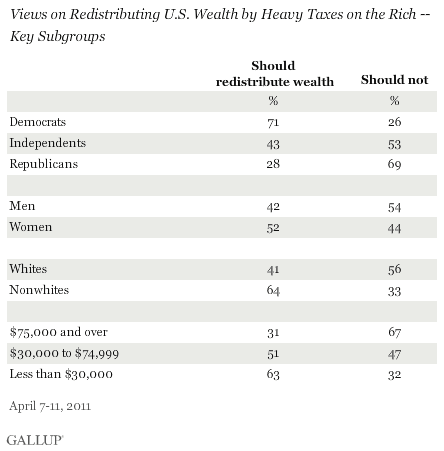
These findings are from Gallup's 2011 Economics and Finance poll, conducted April 7-11.
According to the same poll, the majority of Americans -- 57% -- believe money and wealth in the country should be more evenly distributed among a larger population. About a third -- 35% -- think the current distribution is fair. Americans were slightly less likely to believe the distribution of wealth was fair from 2003 to early 2008; however, the current level is about the average for the full trend since 1984.
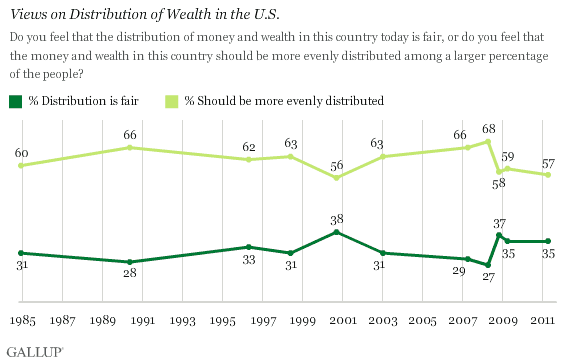
A different question probes Americans' perceptions about the number of rich people in the country, and finds the plurality -- 42% -- believing the current level is about right. However, consistent with every other time Gallup has asked this question since 1990, more believe there are too many rich people than too few, 31% vs. 21%.
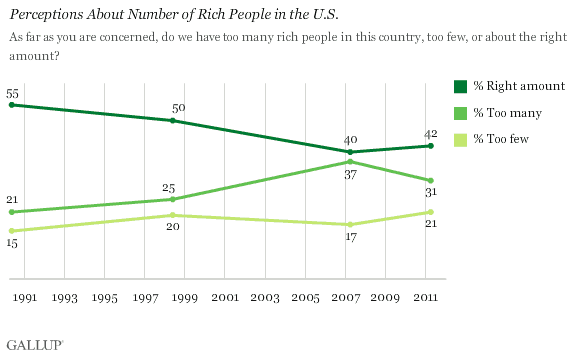
Again, perceptions about wealth are highly partisan, as the majority of Republicans say the number of rich people is about right (52%) and more say there are too few rather than too many (27% vs. 16%). Conversely, one-third (35%) of Democrats say the number of rich people is about right and, by 43% to 15%, more Democrats say there are too many rich people than too few.
Bottom Line
While a solid majority of Americans, 57%, believe money and wealth in the U.S. should be more evenly distributed among the people, fewer than half favor using the federal tax code to do so. The fault line in these views is distinctly partisan, with most Democrats championing redistribution and most Republicans opposing it.
However, these are philosophical views. In practical terms, as government programs and budgets sink in red ink, unions and Democratic leaders at the federal level and in the states are calling for higher taxes on wealthy Americans specifically to help restore fiscal balance and stabilize entitlement programs. Gallup polling last year found two-thirds of Americans in favor of the wealthy paying higher Social Security taxes as a way to help keep that system solvent. Clearly, these attitudes are complex, and support for "taxing the rich" can run higher if framed in the context of specific benefits. Underneath it all, Americans are not "anti-rich," because most believe the country has either the right amount of or too few rich people.
Survey Methods
Results for this Gallup poll are based on telephone interviews conducted April 7-11, 2011, with a random sample of 1,077 adults, aged 18 and older, living in the continental U.S., selected using random-digit-dial sampling.
For results based on the total sample of national adults, one can say with 95% confidence that the maximum margin of sampling error is ±4 percentage points.
Interviews are conducted with respondents on landline telephones and cellular phones, with interviews conducted in Spanish for respondents who are primarily Spanish-speaking. Each sample includes a minimum quota of 400 cell phone respondents and 600 landline respondents per 1,000 national adults, with additional minimum quotas among landline respondents for gender within region. Landline telephone numbers are chosen at random among listed telephone numbers. Cell phone numbers are selected using random-digit-dial methods. Landline respondents are chosen at random within each household on the basis of which member had the most recent birthday.
Samples are weighted by gender, age, race, Hispanic ethnicity, education, region, adults in the household, and phone status (cell phone only/landline only/both, cell phone mostly, and having an unlisted landline number). Demographic weighting targets are based on the March 2010 Current Population Survey figures for the aged 18 and older non-institutionalized population living in U.S. telephone households. All reported margins of sampling error include the computed design effects for weighting and sample design.
In addition to sampling error, question wording and practical difficulties in conducting surveys can introduce error or bias into the findings of public opinion polls.
View methodology, full question results, and trend data.
For more details on Gallup's polling methodology, visit www.gallup.com.
